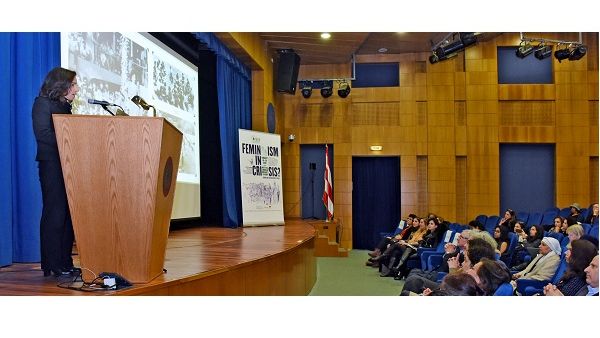AUB Convenes International Scholars on Gender in the Arab Public Sphere

A two-day conference entitled “Feminism in Crisis? Gender and the Arab Public Sphere,” at the American University of Beirut (AUB) allowed more than 60 scholars and activists from around the world to exchange research findings and expertise on women and feminism in the Arab world. Through interdisciplinary collaboration, the conference aimed to set the research agenda around feminism in the public realm.
“The history of Arab feminisms is a history of appropriation, manipulation, and negotiation with power in authoritarian postcolonial states. Arab feminisms, I would argue, are not in crisis, but are constantly operating in crisis mode,” said keynote speaker, Dr. Hoda Elsadda, professor of English and comparative literature at Cairo University and founding member of the Women and Memory Forum. “Understanding the past is a prerequisite for charting the future. And our past is, understandably, strewn with numerous losses and gains, achievements and setbacks, success and frustration. There is significant scholarship that documents women’s movements in the Arab world. Yet much remains unsaid and unwritten… I hereby make a case for the necessity of remembering, preserving our memory, both short term and long term memory.”
With around 50 papers selected out of 80 submissions and distributed across 14 panels, by scholars from the region and around the world to produce research on gender in Arab societies, the conference examined what feminism can accomplish in the next phase, given that the Arab world is presently at the cross roads of different types of crises related to gender in the public sphere. Through keynote speeches, academic papers, and discussions from various disciplines, participants addressed the question in the context of four streams: civil society, social movements, and collective action; political economy, and electoral and public institutions; media, representation, and creative practices; and war, conflict, and displacement. The conference offered an exploration, critique, recommendations for future research, and a proposal of a roadmap for solutions, with a possibility of publishing its outcomes.
“Whether in legislation, government, social movements, media and cultural representations, or knowledge production, women’s agency is constrained, circumscribed, and challenged in our societies; but what happens when these same societies undergo crises that disrupt their very foundations and transform their daily lives?” said Dr. Sara Mourad in her opening remarks as conference co-convener. “What happens to existing inequalities and power hierarchies? Rather than think of crisis as an exceptional, momentary rupture of the existing economic and social fabrics of our societies, this is an invitation to interrogate and challenge a normative understanding of crisis.”
The conference was organized by three AUB associate professors: Dr. Carmen Geha, public administration; Dr. Sara Mourad, media studies; and Dr. Reem Saab, psychology. Collaborating to support the conference were the Center for Arab and Middle Eastern Studies; the Women and Gender Studies Initiative at the Faculty of Arts and Sciences (FAS); and the Asfari Institute for Civil Society and Citizenship at AUB, and the Andrew W. Mellon Foundation.
“We have been actively engaged in mapping and convening the different forms of feminisms in the region while fostering a dialogue among State feminism, Islamic feminism, and globalized feminism representatives without stigmatizing any of these approaches to women’s rights,” said Dr. Dina Khawaga, director of the Asfari Institute for Civil Society and Citizenship at AUB. “We look forward to go a step further through this meeting to allow scholars working on Arab feminisms to undertake the same open-minded spirit and take stock of the diversity of experiences in the region.”
Last year, FAS launched the Women and Gender Studies Initiative, which allowed for a partnering of people, institutes, groups, and student clubs to create a focus on gender as a site of research and intellectual inquiry. Since then, the initiative has been hosting talks by prominent scholars, collaborating with community partners, and re-launched the undergraduate minor in women and gender studies. It has also launched a feminist reading group and a speaker series.
“We need, from our location, here at the heart of the Arab region, to study and research the region from the unique vantage point provided by our location and our intimate knowledge of this region,” said FAS Dean Nadia El Cheikh, who spoke to the audience about AUB’s pioneering role in support of gender equity throughout Lebanese and regional history. “The challenges that we are facing continue to be tremendous. We continue to work amidst exceptionally difficult circumstances for Lebanon and the region. Anyone who knows this place knows the sheer will it takes every day to keep it primarily as an open place for dialogue; to keep the demagogues at bay, from the extreme right to the extreme left, so that it remains a safe place for people to talk with each other, for women to talk with each other.”
Background Information
American University of Beirut
Founded in 1866, the American University of Beirut is a teaching-centered research university based on the American liberal arts model of higher education. AUB has over 9,000 students and over 1,200 instructional faculty members. The University encourages freedom of thought and expression and seeks to graduate men and women committed to creative and critical thinking, lifelong learning, personal integrity, civic responsibility, and leadership.






